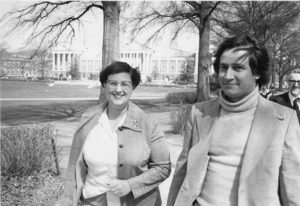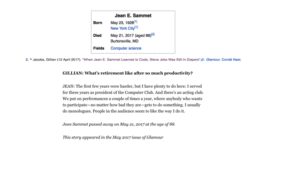This past weekend, trailblazing computer scientist Jean Sammet passed away at the age of 88. I learned this news through emeritus colleague Marv Zelkowitz who lives in the same retirement community that Jean did. He saw the notice of her passing over the weekend on a community bulletin board. (There’s an interesting story about this; see the end of this post!)
Pioneering PL and Computer Science
Jean was one of the early pioneers in computing, and programming languages. She was the inventor of the FORMAC (Formula Manipulation Compiler) programming language, an extension to FORTRAN designed for symbolic manipulations of mathematical formulas. Her interest in this area led her to found ACM SIGSAM, the Special Interest Group in Algebraic Manipulation. Jean also contributed to the development of COBOL. Jean was elected Chair of ACM SIGPLAN in 1971, but resigned one year later after being elected Vice President of ACM. She was elected ACM’s first female President in 1974. She was elected to the National Academy of Engineering in 1977, and after many years of service she was awarded ACM’s Distinguished Service Award in 1985. She has received many other awards as well. She retired from IBM, where she’d worked for many years, in 1988.
A very nice recollection of Jean’s life was recently published in Communications of the ACM. A recent issue of Glamour has an interview with her. Her technical biography is detailed in IEEE’s Annals of the History of Computing (2009).
Jean wrote a retrospective on FORMAC for the The History of Programming Languages (HOPL) conference in 1993. It’s an interesting read. In Jean’s estimation, FORMAC’s success was proof that a language, not just a package or library, was important to programmers in the domain of symbolic computation. This is the sort of argument PL people make today for domain-specific languages. FORMAC, as an extension to FORTRAN, embodied the approach that we now refer to as embedded domain-specific languages. This approach—language extension/embedding—helps with adoption and code reuse, and is in contrast to standalone languages, which have more freedom with syntax and computational model. In symbolic computation, standalone languages such as Mathematica, Matlab, and Maple seem to have won the argument. Jean’s article reflects on why FORMAC was not more successful, with many of the reasons consistent with findings on what facilitates language adoption (or not).
Jean seemed to have a penchant for organization and reflection. Her 1969 textbook, Programming Languages: History and Fundamentals, considered the similarities and differences of 120 programming languages. It would be nice to see more of this sort of organizational and historical work in PL today, especially given the rapid pace of development.
Remembrances
Several of my more senior colleagues were kind enough to share some recollections about Jean on our faculty mailing list. Here are two.
Ben Shneiderman wrote:
I was saddened to hear about Jean Sammet’s death, but smiled in remembering her firm energetic embrace of life every day. She was a real inspiration about being a professional. I remember when she chaired the ACM National Conference around 1985 and generously invited many people to come and spend time in her grand suite at the top of the NY Hilton. She was a key figure in developing early programming languages, especially COBOL.
Her competitive side was strong, causing her to recoil when Grace Hopper was given credit for COBOL. Jean pointed out that Grace was not even on the committee. But Jean was a legend on her own and deserves widespread recognition… maybe a US postage stamp with her on it! Jean’s book on Programming Languages in 1969 was used by many and helped promote that topic as a strong part of computer science. Jean wanted ” to put every person in communication with the computer” – a very early promoter of CS4ALL.
The photo of Jean Sammet published in the Glamour article was Ben’s, and is part of a collection of photos of computer pioneers at the Computer History Museum. Ben hosted Jean on this visit to campus around 1979. She was his boss during a sabbatical visit to IBM around 1982.
Jack Minker also shared a recollection. He wrote
I am saddened to learn that my friend Jean Sammet died. I have known Jean since the 1950s when she worked at Raytheon. Jean was an outstanding computer scientist. I worked with her on many committees of the ACM. She was also an outstanding organizer and leader. Jean was the first woman president of the ACM who served from 1974-1976.
Jean was a principled person who I respected greatly, even when we disagreed. When Anthony Ralston and I wanted to have the ACM involved in human rights for computer scientists, Jean did not believe that it was in the interest of the ACM. Her position was that it was not a technical problem and no business of the ACM. She supported human rights as an individual, but did not believe it was appropriate for an organization. The ACM Board disagreed with her and formed a Committee on Scientific Freedom and Human Rights. I became vice Chair of the committee. We remained friends even though we disagreed. When Jean moved to Bethesda, I invited her to a Passover seder at my house.
Jean made a major impact on computer science and on her service to the ACM in many different positions. Jean will be remembered in the history of computing and by her many friends. May she rest in peace.
I feel fortunate to have learned more about Jean’s inspiring professional career. She seems to have been a passionate and dedicated scientist and servant of those working in the field.
Epilogue: The Date
When I first learned of Jean’s death, I searched for her on the Internet and found her Wikipedia page. I found no public record announcing her passing, but I knew she’d passed away over the weekend, so I edited the wikipedia page with a guessed date, May 21. Later, I learned from Marv that it was actually May 20, per this notice.
I went back to update the Wikipedia page and saw that it now had a reference next to the date, pointing to the Glamour article. This article now had a note at the bottom stating May 21 as the date of Jean’s passing.
I wonder: Did someone with influence at Glamour see my mistaken Wikipedia entry (I tweeted about Jean just after I’d changed it) and then update that article? Then, so updated, did someone else go back to add a citation to it to the Wikipedia page? Interestingly, I tried to change the date on the latter to May 20, but it was later reverted to May 21.
The moral of the story is: information sticks! If you don’t get it right the first time, it may never be right. I guess this is my own contribution to “fake news.”




Mike, so glad you posted this tribute. Jean and J A N Lee and a few others worked really hard back in the 70s and 80s to document much of the early history of programming languages and compilers. Sadly a lot of the early work in PL isn’t given proper recognition today. I expect many PhDs in the field graduate with little appreciation of the research that went into the Algol family of languages or the impact of APL on CS in the 70s. Let’s try to honor Jean by taking a little more time to record and recognize the really rich history of PL.
Pingback: Data Sheet—Friday, June 9, 2017 – StartupFlux Digest